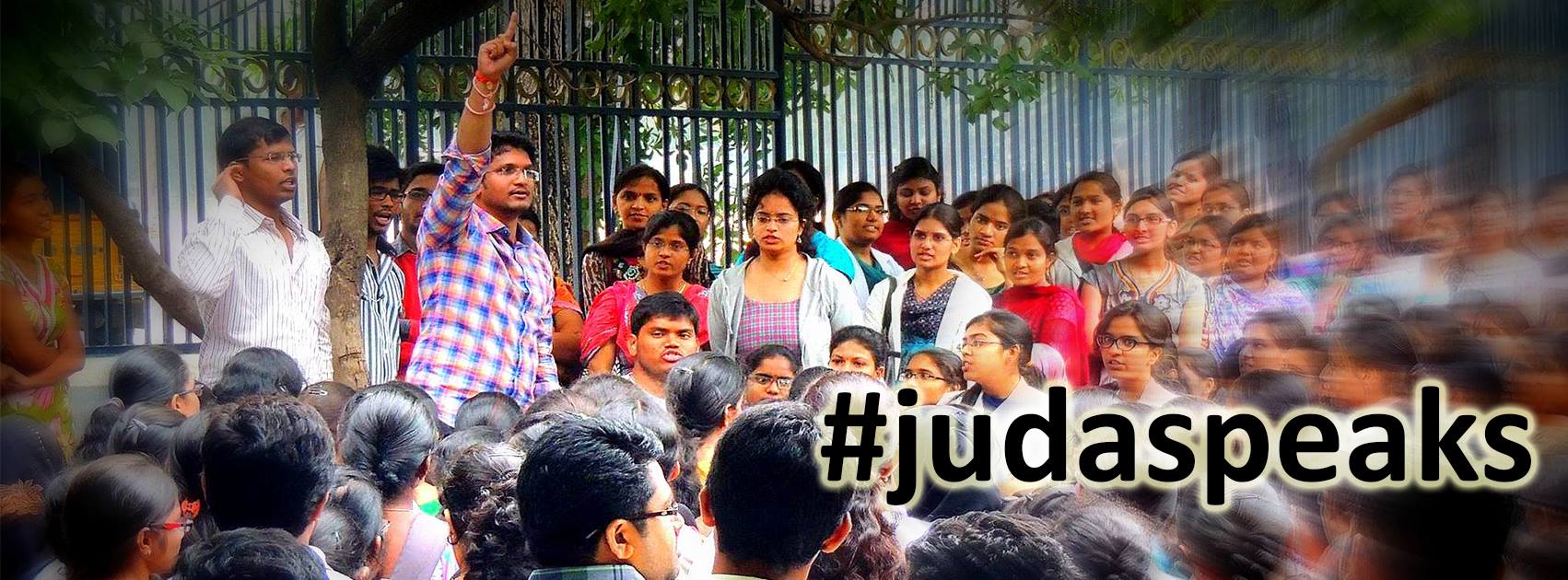The Telengana Junior Doctors Association (TJUDA) has been on strike for the past two months urging the government to scrap the mandatory temporary bonded placements in rural areas. Before deciding to go on strike, TJUDA sent several delegations for at least four months, but received no response from the government.
TJUDA is fighting against the flaws in the present health care policy, and looking for possible solutions.
In 2010 February, a Government Order(GO) was passed in Andhra Pradesh stating that all students who complete MBBS, PG (Diploma/Degree), and Super Specialty shall render a year’s compulsory rural service by a bonded obligation. APJUDA carried an agitation against this ‘bonded labor’ and some other irregularities for about 45 days between December 2011 and Feb 2012. At the end, a Bipartite Agreement was drawn up between the government and TJUDA representatives, and the government agreed to 11 of the association’s demands.
All the fresh pass outs are posted in medical colleges located in cities. This makes the term “rural service” a misnomer, as the posts in rural areas remain vacant.
One of these demands was that “a committee shall be formed to study the implementation of rural service and the committee shall submit its report by April 30, 2012”. Unfortunately the committee was not formed till June 2012. It had eight members, three representing the TJUDA and five representing the government. TJUDA representatives raised several questions like the method of selection, emoluments, maternity leave, eligibility for higher studies etc., to which the government did not offer any answer. At the end of three discussions, only four government members signed the committee report.
In July 2013, GO Ms No 107 (which directs the implementation of rural service) was passed by government based on the recommendations of an Expert committee appointed by Dr. NTR University of Health Science, ignoring the original eight-member committee’s report. According to this GO, students are required to undergo one year’s compulsory bonded government service after the successful completion of Medical Post Graduation/Diploma/DNB course / Super Specialty Degree courses and Dental Courses (except for service quota candidates) from all government private & minority colleges.
Reasons for opposition
The Junior Doctors Association is opposing the compulsory rural service system for several reasons. First of all, all the fresh pass outs are posted in medical colleges located in cities. This makes the term “rural service” a misnomer, as the posts in rural areas remain vacant. In addition, the government does not issue registration to students unless they complete one year’s mandatory service. How can doctors be expected to treat without having registrations? Under this system, even failed students are allowed to treat patients, all of which goes against the law.
The association also alleged that the government was using fresh medical graduates as cheap labour by forcing them to sign a bond of Rs. 20 lakh. Many of these students are from poor and middle class families, and for them even getting the surety bond signed by two gazetted officers is a difficult task. Their merit seats are denied to them if they fail to get the bond signed, which is a form of sheer bonded slavery!
Moreover, under this system, fresh graduates will be rotated every year, with no scope of experienced doctors working in rural areas. Don’t our rural people deserve to be treated by experienced doctors?
Due to irregularities in recruitment into health services in the state, there are numerous vacancies in specialist’s categories in rural areas, despite the willingness of the doctors to work. When temporary recruitments become the norm, permanent recruitments take a hit. The associations allege that the government is trying to take advantage of the present system so as to avoid permanent recruitments. This leads to the circulation of batches of inexperienced doctors to rural areas every year. In other words, the government is experimenting with people’s health.
The government claims that there is an acute shortage of doctors who are willing to go to rural areas. But the fact is that there were 16,000 applications for the 1,100 vacant posts of civil assistant surgeons in December 2013
The problem is compounded by the fact that in the name of mandatory temporary service, doctors are posted in domains other than their specialty. Dermatologists and pathologists are posted in emergency department, and orthopedics are asked to conduct deliveries. This is not just misuse of the doctor’s expertise. They are unable to help patients in need of that particular specialty treatment.
The government claims that there is an acute shortage of doctors who are willing to go to rural areas. But the fact is that there were 16,000 applications for the 1,100 vacant posts of civil assistant surgeons in December 2013, which clearly shows that there is, in fact, competition among junior doctors to go to rural areas and serve the public.
TJUDA is also fighting against the inadequate number of Public Health Centres (PHCs) at village level, Community Health Centers (CHCs) and area hospitals in towns and districts, besides the inadequate number of posts sanctioned for doctors in the existing hospitals. According to the combined AP statistics released by Government of India Health and Family Welfare Department in March this year, the state has 1,709 PHCs instead of the required 2,002 and 292 CHCs have been established instead of 501. They are also demanding regular recruitment to sanctioned posts. According to the same data, 668 specialist doctor posts were sanctioned out of the required 1,168. But the government has not done any recruitment of specialist doctors since 2010. Doctor-patient ratio remains low in rural areas, and these problems cannot be solved by temporarily appointing students to these places.
Proposed solutions
Instead, the association suggests, the government should formulate the health policy with long-term goals in mind rather than political benefits. Permanent recruitment should be done on a regular basis, a separate recruitment board should be established and vacancies should be notified and duly filled every year. Temporary/ forced/ bonded placement should be stopped.
The association also proposes that performance-based incentives should be offered to doctors to promote healthy competition among the doctors. In addition, infrastructure should be developed at all levels and measures should be taken to ensure that they are well-utilized.
May God help us provide good and affordable health care to all.
PLEASE LIKE US ON FACEBOOK www.facebook.com/judaspeaks







Great article afroz bhai,very informative